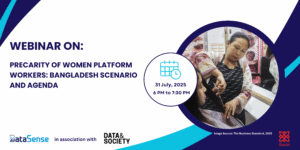
View the full recording of the webinar here
The rapid digitalization of labor markets is transforming work across the globe, offering both opportunities and challenges. In Bangladesh, the platform economy is expanding rapidly, yet women workers continue to face precarious, low-paid, and under-protected roles. This webinar will address the gendered dynamics of the gig economy, assess labor protections, and propose actionable policy reforms.
The rapid digitalization of labour markets is reshaping work globally particularly through the rise of digital platforms. These platforms create opportunities for employment, income generation, and flexible work arrangements for everyone. However, they also bring significant challenges, especially for women who often are occupied in precarious roles in the gig economy. In 2018, there were an estimated 43 million gig workers globally, a number projected to rise to 78 million by 2023 (Financial Times, 2020). Additionally, the market size of the global gig economy was USD 556.7 billion in 2024, and the market is expected to expand to USD 1,847 billion in 2032 (Business Research Insights, 2025).
Bangladesh is now the second largest supplier of online labour in the world, with a 16% of the global online workforce, following India which has a 24 per cent share of the global online workforce (Oxford Internet Institute, 2017). Together, the informal and gig economies contribute approximately 43% to Bangladesh’s GDP (Khondkar, 2019). The platform economy in Bangladesh witnessed a 27% growth in 2021 which has increased during the COVID-19 pandemic (The Business Standard, 2022). Despite these advancements in labour market, 85.1% of the workforce remains in the informal sector and they are marked by limited protections and high vulnerability (BBS, 2017).
Women in the gig economy are predominantly engaged in traditionally “feminine” roles such as caregiving, beauty services, and domestic work (Hunt et al., 2019; Chaudhary, 2020). These jobs often require low skills which expose women to unstable incomes, inadequate labour protections, and gender-based discrimination (Kasliwal, 2020). Despite the promise of platformization to formalize work, many women experience “formalized precarities” rather than improved conditions (DataSense, 2024).
The digital transformation of the labour market is opening new market opportunities, driving productivity growth, supporting industrial advancement, and creating varied employment options. Digital labour platforms have become significant sources of employment and income, contributing to the rapid expansion of the gig economy. While the informal sector in Bangladesh faced significant setbacks during the COVID-19 pandemic, the platform economy thrived, recruiting over 30,000 new workers to meet the rising demand, especially in urban hubs like Dhaka (Moazzem & Taznur, 2021).
Despite this expansion, challenges persist in ensuring basic worker protections. Globally, other regions have made progress; for instance, the European Union is actively pursuing legislation to classify gig workers as employees to guarantee fair wages and benefits. These comparisons underscore the need for tailored reforms in Bangladesh to address the unique vulnerabilities faced by female gig workers. To address the precarious conditions faced by women in the gig economy, it is essential for platforms to formalize the employment status of gig workers by recognizing them as employees rather than independent contractors. There is an urgent need to assess the impact of digital labour platforms, especially on women, understand the policy gaps, and propose actionable reforms.
🟧 Objectives of the Webinar
- Stakeholder Engagement: Bring together key voices: government, platforms, unions, researchers, and civil society to share insights.
- Improve Working Conditions: Focus on labor protections, fair wages, and social security.
- Labor Law Reform: Analyze policy gaps and suggest evidence-based solutions.
- Outreach to Workers: Equip workers with knowledge and pathways to advocacy.
- Drive Policy Change: Spark momentum for structural reform and gender-inclusive growth.

